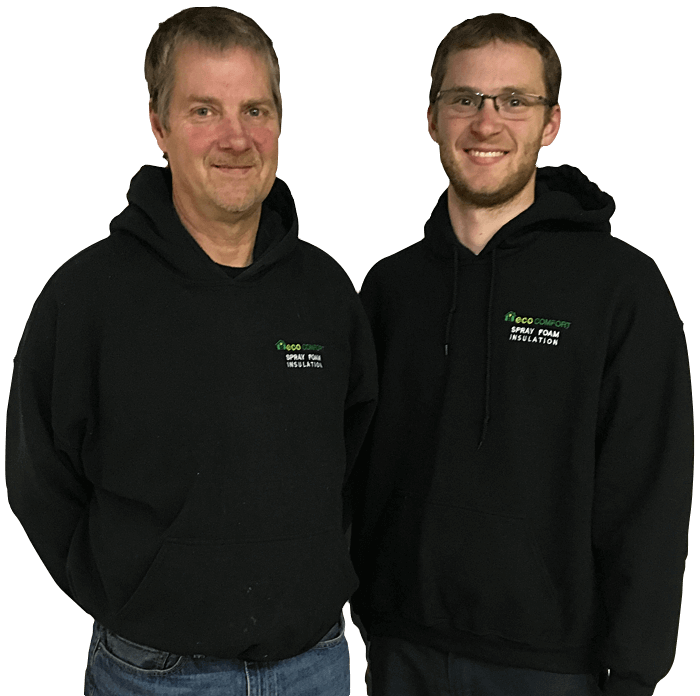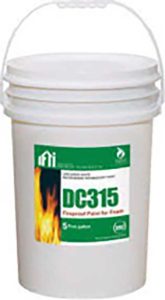Does spray foam insulation need to be covered?
This is probably the most commonly asked question we get when we are looking at a prospective project. Firstly lets start by saying closed cell 2lbs density spray foam does not need to be covered by a vapour barrier. The function of vapour barriers is a topic all its own, but for this article we just need to know they are not required with closed cell spray foam.
Another common misconception is that spray foam needs to be covered because it will off-gas, this is also not true, spray foam is a two part product that reacts very quickly and becomes inert within seconds of being sprayed. With that being said there are situations where spray foam should be covered with a thermal barrier.
What is a thermal barrier?
Thermal barrier is a term used to describe any product that is used to protect something from thermal damage in the case of a fire.
The Ontario Building Code requires foam insulation products to be protected with a 15 minute thermal barrier if they are inside the building envelope. This includes foam board, spray foam, ICF blocks and any other “foamed plastic” products.
There are a few options home owners and installers have to conform to this requirement. Most commonly ½” drywall board. Other options include Monocote z-3306, a cementitious spray-on product and DC315 an intumescent paint product. DC315 has been used in the U.S. market for many years and was approved for use in Canada in 2015 and has become very popular for situations where a thermal barrier is required but drywall is not feasible.
What is the purpose of a thermal barrier?
Spray foam insulation will not support flame by itself, its self-extinguishing but it will burn in the presence of flame. In other words if you were to take a torch and hold it to a piece of spray foam, the foam would burn, as soon as you pulled the torch away the foam would stop burning. The problem is when plastic products burn they create smoke that is harmful.
The purpose of the thermal barrier is to provide a 15 minute protection period. The other important thing to note is that the Ontario Building code pertains only to the structure itself, in the case of a house fire your home is filled with furniture and other products that will create smoke very quickly, its critical to have sufficient smoke alarms in place as a first line of defence.
What situations are thermal barriers required?
We have worked in many different townships with many different building officials and the regulations are interpreted a little differently by each of them. In the case of a new build or a renovation with a building permit the general rule of thumb is any livable, heated space with foam insulation will need a thermal barrier in place. There are a lot of variables, for example, a crawl space with no inside access and no forced air heating may not require a thermal barrier because it is isolated from the living space. In most cases attics fall under the same ruling with the ceiling drywall acting as the thermal barrier. Its always best to refer to your building inspector, they are the ones who will ultimately decide whether a thermal barrier is required or not.
In situations where there is no building official overseeing the project we recommend you consult your insulation installer for their thoughts on the specific project and whether or not thermal barrier is recommended.
Summary
In summary, according to the Ontario Building Code inside a residential building envelope all foam insulation products should be covered with an approved thermal barrier. This includes foam board, ICF blocks, and of course spray foam insulation.
That being said, in most situations drywall is going to satisfy this requirement, in certain special cases a spray-on thermal barrier may be used.
For more information about the Ontario Building Codes thermal barrier requirements visit: http://www.buildingcode.online/40.html

What to Expect?
When you work with Ecocomfort Spray Foam, here’s what you can expect from our spray foam insulation installers:
-
Thorough Assessment: We conduct a detailed assessment of your property to understand your insulation needs and recommend the best solutions.
-
Customized Recommendations: Based on our assessment, we provide personalized recommendations for spray foam insulation that align with your budget and objectives.
-
Efficient Installation: Our installers ensure efficient and precise spray foam insulation installation, minimizing disruptions and maximizing insulation benefits.
-
Quality Assurance: We conduct post-installation inspections to ensure that the insulation meets our high quality and performance standards.


